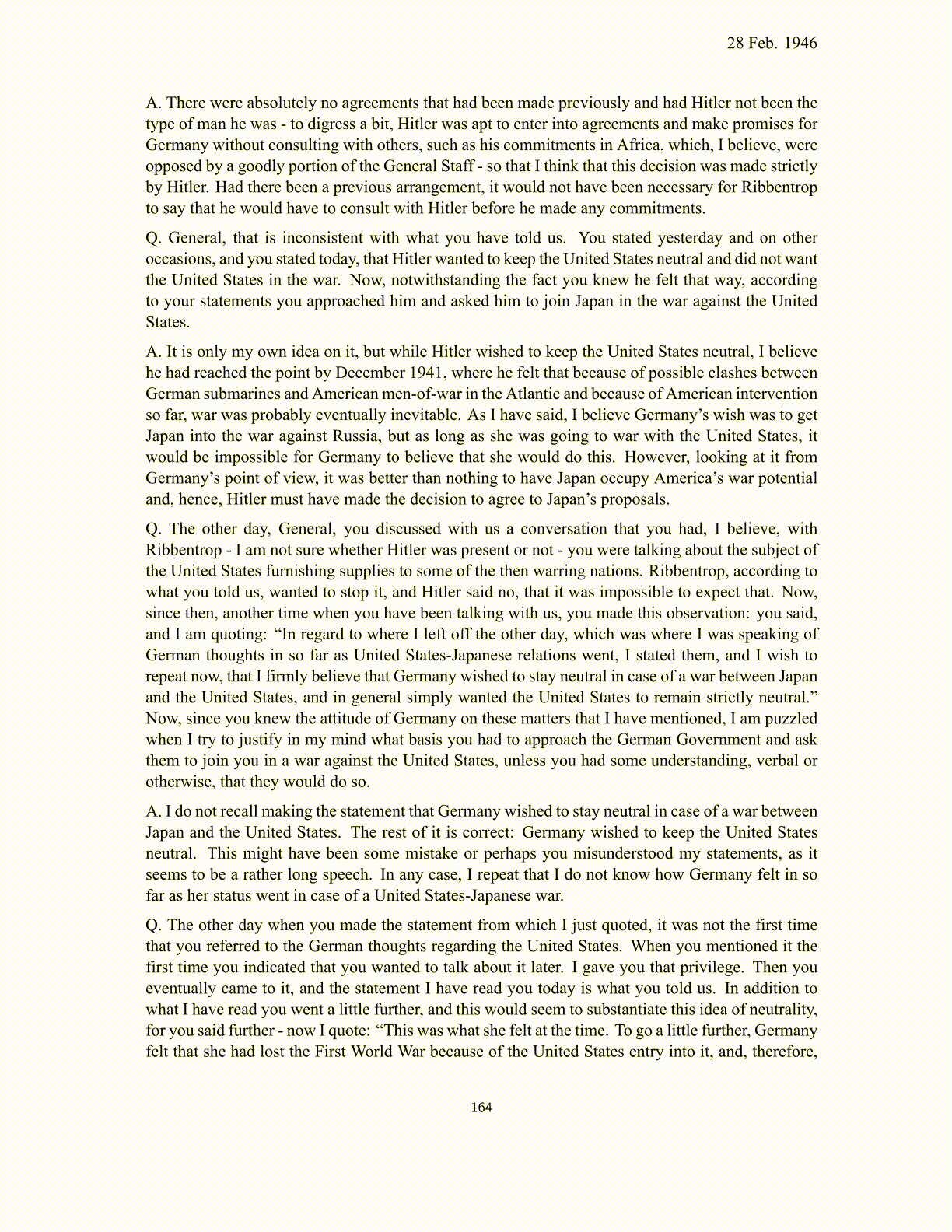
28 Feb. 1946 A. There were absolutely no agreements that had been made previously and had Hitler not been the type of man he was - to digress a bit, Hitler was apt to enter into agreements and make promises for Germany without consulting with others, such as his commitments in Africa, which, I believe, were opposed by a goodly portion of the General Staff - so that I think that this decision was made strictly by Hitler. Had there been a previous arrangement, it would not have been necessary for Ribbentrop to say that he would have to consult with Hitler before he made any commitments. Q. General, that is inconsistent with what you have told us. You stated yesterday and on other occasions, and you stated today, that Hitler wanted to keep the United States neutral and did not want the United States in the war. Now, notwithstanding the fact you knew he felt that way, according to your statements you approached him and asked him to join Japan in the war against the United States. A. It is only my own idea on it, but while Hitler wished to keep the United States neutral, I believe he had reached the point by December 1941, where he felt that because of possible clashes between German submarines and American men-of-war in the Atlantic and because of American intervention so far, war was probably eventually inevitable. As I have said, I believe Germany’s wish was to get Japan into the war against Russia, but as long as she was going to war with the United States, it would be impossible for Germany to believe that she would do this. However, looking at it from Germany’s point of view, it was better than nothing to have Japan occupy America’s war potential and, hence, Hitler must have made the decision to agree to Japan’s proposals. Q. The other day, General, you discussed with us a conversation that you had, I believe, with Ribbentrop - I am not sure whether Hitler was present or not - you were talking about the subject of the United States furnishing supplies to some of the then warring nations. Ribbentrop, according to what you told us, wanted to stop it, and Hitler said no, that it was impossible to expect that. Now, since then, another time when you have been talking with us, you made this observation: you said, and I am quoting: “In regard to where I left off the other day, which was where I was speaking of German thoughts in so far as United States-Japanese relations went, I stated them, and I wish to repeat now, that I firmly believe that Germany wished to stay neutral in case of a war between Japan and the United States, and in general simply wanted the United States to remain strictly neutral.” Now, since you knew the attitude of Germany on these matters that I have mentioned, I am puzzled when I try to justify in my mind what basis you had to approach the German Government and ask them to join you in a war against the United States, unless you had some understanding, verbal or otherwise, that they would do so. A. I do not recall making the statement that Germany wished to stay neutral in case of a war between Japan and the United States. The rest of it is correct: Germany wished to keep the United States neutral. This might have been some mistake or perhaps you misunderstood my statements, as it seems to be a rather long speech. In any case, I repeat that I do not know how Germany felt in so far as her status went in case of a United States-Japanese war. Q. The other day when you made the statement from which I just quoted, it was not the first time that you referred to the German thoughts regarding the United States. When you mentioned it the first time you indicated that you wanted to talk about it later. I gave you that privilege. Then you eventually came to it, and the statement I have read you today is what you told us. In addition to what I have read you went a little further, and this would seem to substantiate this idea of neutrality, for you said further - now I quote: “This was what she felt at the time. To go a little further, Germany felt that she had lost the First World War because of the United States entry into it, and, therefore, 164